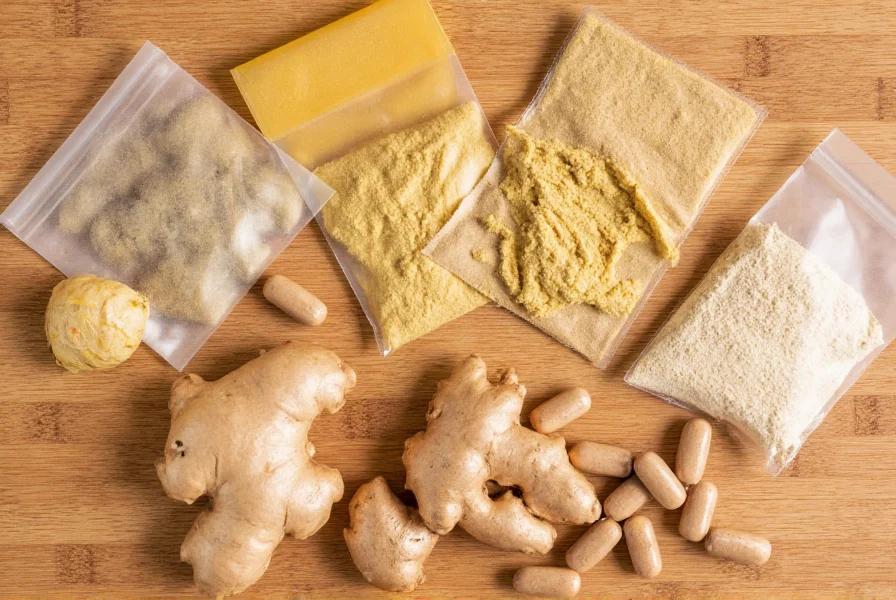For centuries, traditional medicine systems have utilized ginger root for digestive complaints, and modern science now validates these applications. This versatile rhizome contains bioactive compounds like gingerols and shogaols that interact with the digestive system in multiple beneficial ways. When consumed before or after meals, ginger root stimulates saliva and gastric enzyme production while relaxing intestinal muscles, creating optimal conditions for efficient digestion.
How Ginger Root Enhances Digestive Function
Ginger's digestive benefits stem from its unique biochemical properties. The primary active compounds—gingerols and shogaols—interact with serotonin receptors in the gastrointestinal tract, which helps regulate motility and reduce spasms. Research published in the World Journal of Gastroenterology demonstrates that ginger accelerates gastric emptying by up to 25% compared to placebo, making it particularly valuable for individuals experiencing slow digestion or functional dyspepsia.
Unlike many pharmaceutical digestive aids, ginger works through multiple mechanisms simultaneously:
| Mechanism | Effect on Digestion | Scientific Support |
|---|---|---|
| Gastric motility enhancement | Speeds stomach emptying by 20-25% | Multiple clinical trials |
| Anti-nausea properties | Reduces nausea intensity by 30-40% | Systematic reviews |
| Anti-inflammatory action | Decreases gut inflammation markers | Cellular and animal studies |
| Enzyme stimulation | Increases digestive enzyme production | Human clinical research |
Scientific Evidence on Ginger for Digestive Health
A comprehensive review in Nutrients analyzed 14 clinical trials involving over 1,200 participants and concluded that ginger significantly reduces symptoms of indigestion, particularly bloating and early satiety. The most effective dosage range identified was 1.2-1.5 grams of powdered ginger daily, with effects typically noticeable within 1-2 weeks of consistent use.
For motion sickness and pregnancy-related nausea, research shows ginger outperforms placebo with minimal side effects. A study in the Journal of Alternative and Complementary Medicine found that 1 gram of ginger reduced nausea severity by 38% compared to placebo in participants with functional dyspepsia. The researchers noted improvements in gastric myoelectrical activity, suggesting ginger helps normalize stomach rhythm.

Practical Applications for Digestive Wellness
Understanding how to incorporate ginger root for digestion requires attention to form, timing, and dosage. For general digestive support, consume 1-2 grams of fresh ginger (about a 1-inch slice) 20 minutes before meals. This timing allows ginger to stimulate digestive enzymes before food arrives in the stomach.
Different forms offer distinct advantages:
- Fresh ginger: Highest concentration of active compounds; grate into teas or meals
- Ginger tea: Gentle option for sensitive stomachs; steep 1-2 grams in hot water for 10 minutes
- Powdered ginger: Convenient for precise dosing; 1-1.5 grams daily provides optimal benefits
- Ginger supplements: Standardized extracts ensure consistent potency; look for 5% gingerols
For acute digestive discomfort, chew a small piece of crystallized ginger or drink ginger tea immediately. Many people find that regular consumption (daily for 4-8 weeks) yields the most significant improvements in chronic digestive issues like bloating and irregularity.
Safety Considerations and Potential Interactions
While ginger root is generally safe for digestive health, certain precautions are necessary. The maximum recommended daily intake is 4 grams to avoid potential side effects like heartburn or mouth irritation. Individuals taking blood thinners should consult their physician before using therapeutic doses of ginger, as it may enhance anticoagulant effects.
Those with gallstones should exercise caution, as ginger stimulates bile production. Pregnant women can safely use ginger for nausea (up to 1 gram daily), but should avoid high doses without medical supervision. If you experience persistent digestive issues despite ginger use, consult a healthcare provider to rule out underlying conditions.

Comparing Ginger with Other Natural Digestive Aids
When considering natural remedies for digestive health, ginger offers unique advantages over alternatives like peppermint or fennel. While peppermint relaxes digestive muscles (helpful for IBS but potentially problematic for GERD), ginger actively stimulates digestion without relaxing the lower esophageal sphincter. This makes ginger a better choice for individuals with acid reflux who still need digestive support.
Fennel primarily addresses bloating through carminative effects, whereas ginger works on multiple aspects of digestion including enzyme production, gastric motility, and nausea reduction. For comprehensive digestive support, some practitioners recommend combining ginger with other botanicals based on specific symptoms—ginger for overall digestion, peppermint for spasms, and fennel for gas relief.
Frequently Asked Questions
How quickly does ginger work for digestion?
Ginger typically begins working within 20-30 minutes when consumed before meals. For acute nausea, effects may be noticeable within 15 minutes. Chronic digestive issues usually show improvement within 1-2 weeks of consistent daily use at therapeutic doses (1.2-1.5 grams).
Can ginger help with bloating and gas?
Yes, ginger reduces bloating by accelerating gastric emptying and improving intestinal motility. Research shows it decreases the time food spends fermenting in the gut, which reduces gas production. For best results, consume ginger 20 minutes before meals likely to cause bloating.
What's the optimal ginger dosage for digestive benefits?
The optimal dosage for digestive support is 1.2-1.5 grams of powdered ginger daily, equivalent to about 10 grams of fresh ginger. This can be divided into 0.5-1 gram doses taken before meals. Higher doses (up to 4 grams daily) are generally safe but may cause mild heartburn in sensitive individuals.
Is fresh ginger more effective than supplements for digestion?
Both forms can be effective when properly dosed. Fresh ginger contains higher levels of certain volatile compounds, while standardized supplements ensure consistent gingerol content. For digestive benefits, 10 grams of fresh ginger provides similar effects to 1 gram of standardized extract containing 5% gingerols. Choose based on convenience and personal preference.











 浙公网安备
33010002000092号
浙公网安备
33010002000092号 浙B2-20120091-4
浙B2-20120091-4